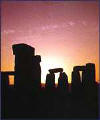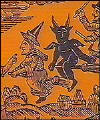You have arrived at our Archive
Site. We have recently remodeled and if you click the Home button
you will be transported to our new word press site. If you are on
a product page, all the BUY NOW buttons have been updated to go directly
to the new word press product page. Please update your bookmarks to https://www.celticattic.com
When Wales welcomed witches
As if by magick, witches have rarely received a good press.
Much-maligned throughout history, brooomsticked dabblers in the black
arts were, at various times, chased, ridiculed, ostracized and murdered.
Long before Harry Potter was a glint in J.K. Rowling's eye, his
wizardly contemporaries were subject to the great witch hunts which
swept Europe in the Middle Ages, killing 200,000 suspects.
 Witches
and wizards are linked to druids
Witches
and wizards are linked to druids
But Wales, a new book reveals, was a relative haven for paranormal
practices, sparing the pointy-hatted pagans from hanging, drowning and
other unhappy endings.
In "Pembrokeshire Witches and Wizards," author Brian John claims the
Welsh druidic tradition lent a tolerance to the cause of witchcraft
which still persists.
"Only three witches in Wales went to trial, in 1656," says John. "And
that was at an English court in Chester.
Druid wisdom
"Many people viewed them as the natural inheritors of the old wisdom
of the druids.
"There was an extraordinary degree of tolerance and respect for
witches as members of society.
 The
devil was not demonized in Wales
The
devil was not demonized in Wales
"Wales was 500 years ahead of everyone else in accepting them."
In the 1600s, as conflict raged between ambitious Roman Catholic and
protestant disciplines, pagans were blamed and hunted for practicing
forms of magick woven from a rich tapestry of folk traditions.
Those beliefs flew in the face of mainstream religion and, demonized,
suspected witches were put on trial and executed.
"In Wales, that didn't happen," adds John.
Magick respect
"Often, witches were just old ladies who only wanted a crust of bread
and would take advantage by threatening to place curses on villagers.
"Genuine witches were looked on as healers and wizards had the
observational powers of detectives and, you could say, were the first
psychiatrists of the age.
"Wales was 500 years ahead of everyone else in
accepting witches - Brian John, author
"They were all helped by the deep-seated respect in Wales for magick
and connection with the spirit world."
In contrast to worldly perceptions of the paranormal, villagers in
Wales were spellbound by their neighbours, living in harmony despite
occasionally falling victim to spells or curses from an upset occult
expert.
In such circumstances, John's book claims, locals might approach a
stronger witch in a canny bid to have the incantation removed.
Even Satan was a "foolish" figure who villagers sent packing with his
tail between his legs.
Eirlys Gruffydd, who has also written books on witches, said: "They
were poor people who were scapegoats for all the misfortunes in society.
"I think people probably needed the wise woman and herbalists because
there were no doctors."
In many cases, wizards were even religious ministers with a druidic
past.
Descendents of Carmarthenshire wizard John Harries, who practiced in
the 19th century, are still rumored to possess mystical powers,
according to the author.
And acceptance for magick remains - outside of fashionable forms of
Wicca and paganism, acts prohibiting practice of witchcraft were
repealed only in the 1950s.